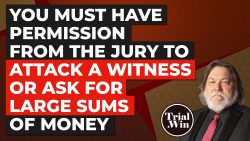By Hon. (Ret.) Ken E. Adair 
Get Connected Early On
Video Transcribed: What does it mean to have permission from a juror or from a jury? Well, before you can ask the tough questions of a juror in voir dire, or you can ask them to ask the judge to excuse them from this jury panel, before you can attack the veracity of a witness or before you can make that tough argument or ask for lots of money in a closing argument, you have to have permission from the jury. What does that mean?
Well, that means, first of all, that you’ve connected with the jury and that you have been present throughout the trial or you’re present and in the moment when you are asking the questions or preparing to ask the tough questions or preparing to ask for money.
My very favorite quote in the world is from Lucius Seneca, he’s a first-century Roman philosopher. He says that beasts avoid the dangers which they see, and when they have escaped they are free from care. We torment ourselves over that which is to come as well over that which has passed. Many of our blessings bring bane to us for memory recalls the tortures of fear while foresight anticipates them. The present alone can make no one wretched.
That’s the important thing. If you’re in the moment and you know where you are with regard to your story, with regard to where the jury is with this witness or where you’ve made this juror feel safe in answering certain questions, if you try to attack a witness’s credibility without permission from the jury, they’re not going to be with you and you’re going to alienate and offend your jury. If you ask a juror to ask the judge to be excused in voir dire, that’s a tough ask.
 How do you be present? The first thing you do is get out of your chest. If you’re in front of a jury and you’re in voir dire and you’re talking like this and you’re saying, “Voir dire is a French word. In Texas and Oklahoma, we say voir dire instead of voir dire,” and you just get all this nonsense in your chest, fight, flight or freeze mode, you’re not present. You’re in your chest. You’re not in your mind. You’re not in your heart, which is more important.
How do you be present? The first thing you do is get out of your chest. If you’re in front of a jury and you’re in voir dire and you’re talking like this and you’re saying, “Voir dire is a French word. In Texas and Oklahoma, we say voir dire instead of voir dire,” and you just get all this nonsense in your chest, fight, flight or freeze mode, you’re not present. You’re in your chest. You’re not in your mind. You’re not in your heart, which is more important.
The first thing you do is take a deep breath and blow it all the way, get out of your chest, get into your gut, and make eye contact with the jurors. Then, you get out of your chest. If you got to take two or three breaths, deep cleansing breaths, you make eye contact with the jurors before you utter a word. I did a video on this. That helps you get a present.
Now, when you’re talking to jurors, I had one at my most recent jury trial where I had a man that didn’t want to sit in judgment of the defendant in a car wreck case. I said, “Well,” I said, “Sir if I submit to you that you’re not judging that person morally, you’re just judging their behavior. If you judge that they were at fault for my client’s injuries, you then must assess the value of the damages. You’re not morally judging anybody. You’re just judging fault. You’re assessing the value of damages, including non-economic damage.”
He says, “I really don’t feel comfortable doing it.” I could tell he was genuinely struggling. He wasn’t just trying to get out of jury duty. I finally asked him, I said, “Well, sir, would you feel comfortable asking the judge to excuse you from this jury?”
He said, “Yeah, I think that would be best.” Now I had permission to do that because he was… I tested him. I tried to rehabilitate a juror that didn’t want to sit in judgment of a civil defendant. I trusted him. I asked him that question. I looked at the judge and I said, “I move to strike him for the cause.” I looked kindly at the juror after I said it. The injury defense lawyer had no objection. He was excused, but I had permission.
Now, imagine if he’d said something and I bowled upon him and I’m like, “He can’t stand in judgment. I ought to move to strike him for cause,” well, I’ve just offended the whole jury. Remember these jurors bond. Even when they don’t have the cash and they’re not discussing the case, they’re talking about kids and grandkids, where they went to school, where they grew up, kind of music they like, they’re hanging out together, going out on smoke breaks together, going to the vending machines together, going to the jury room together. They’ve already bonded.
If you offend a juror, chances are you’re going to offend the jury. You have to have permission. If you’re going to move in for the kill on cross-examination and try to challenge the veracity of a witness, you need to be present and aware of where the jury is with regard to this witness.
If you think this witness is a liar and you look over and the jury’s not getting it, you don’t have permission to dig in and challenge this witness aggressively. When you’re asking some foundational questions and the jurors are looking confused and you look over at them, look, you should just do it just to practice looking over at the jury, like, “How are y’all doing over there?”
Just look at them. Don’t say that, but your eyes say, “How are y’all doing over there? You with me? Are you with me?” Don’t do it in a corny way. Don’t do it aggressively animated. You just look at them, check-in with them. When you see that they’re confused by this witness’s testimony and they’re looking at the witness funny, you know you have permission.
An old mentor and friend of mine, Patrick Williams here in Tulsa, was a great criminal defense lawyer. He told a story about a police officer. Every time he’d answer a question, he’d start by talking about his seven years of training and experience, based on my seven years of training and experience. Well, in my seven years of training and experience, I’ve seen this and that, and I’ve come to believe this and that. Every time this officer answered a question, he’d start it that way.
Well, Patrick, he was very tall, deep, booming, Tennessee Ernie Ford voice or Sam Elliott voice for all that know who he is. He looks over at the jury and he sees their confusion. He starts challenging the veracity and the recall of this witness. He starts challenging his expertise. Once he got done, he got done.
He didn’t get an a-ha moment. In his closing argument, he looked at the jurors and he said, “You recall this officer who kept talking about his seven years training and experience? Well, let me remind you, folks, that seven times zero is still zero,” and the whole jury laughed. He had permission to make that statement, he had permission to make the argument that he was not a credible witness. He had permission to attack him on the witness stand in the first place because he paid attention to where the jury was.
Asking for money. I asked a jury, my second civil jury trial, I asked for $11 million. I had them with me the whole week. They were with me the whole time. When I asked for $11 million, my favorite juror, the one who was with me all the time, was on the back row and her eyes got big like she’d caught me cheating on her or something. She was betrayed. I had betrayed that jury and I knew I’d betrayed them because of the look on their face, but I didn’t have permission from that jury.
I had not done my homework, I’d not laid the foundation. I didn’t check in with them first about asking for money. I didn’t prepare them for the ask. I betrayed them. I didn’t have permission to ask for $11 million. They gave my client one and a half million dollars, and that was not a good verdict in my mind because I thought it was worth $11 million.
A lot of people patting me on the back since that was my second civil jury trial, but I was disappointed in that verdict. It traumatized me for about two months. I felt sick about it. Make sure you have permission.
Get connected early on, take a deep breath, get into your gut, glance over at the jury, check on them regularly. Are you with me? How are y’all doing over there? Check-in with them and make sure you have permission to ask the tough questions in voir dire or to attack a witness or to ask for lots of money. It’s an important concept. It’s a little bit abstract, but in practice, it’s not terribly abstract at all.
I hope this video has been a little bit helpful to you. It’s a little bit longer of a video, but it’s a very abstract subject. I hope this has been helpful to you, and I look forward to talking to you some more. This has been Oklahoma trial attorney Ken Adair. If you are looking for co-counsel services or an experienced jury consultant, visit trial.win.



